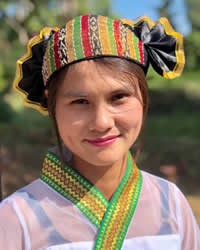Shan in Myanmar (Burma)

Photo Source:
Copyrighted © 2026
Kerry Olson All rights reserved. Used with permission |
Send Joshua Project a map of this people group.
|
| People Name: | Shan |
| Country: | Myanmar (Burma) |
| 10/40 Window: | Yes |
| Population: | 4,851,000 |
| World Population: | 4,958,400 |
| Primary Language: | Shan |
| Primary Religion: | Buddhism |
| Christian Adherents: | 0.90 % |
| Evangelicals: | 0.82 % |
| Scripture: | Complete Bible |
| Ministry Resources: | Yes |
| Jesus Film: | Yes |
| Audio Recordings: | Yes |
| People Cluster: | Shan |
| Affinity Bloc: | Southeast Asian Peoples |
| Progress Level: |
|
Introduction / History
The Burmese Shan are a large group of civilized people who migrated south from China in the twelfth century and established three small states in Myanmar. The Shan language belongs to the southwestern group of tonal languages. The people refer to themselves as the Great Tai. One of the Shan speaking groups is the Tai Man.
What Are Their Lives Like?
Agriculture is the driving force in the Tai Man economy. Rice is the major cash and family crop. Other crops include tea, soybeans, peanuts, coffee and cotton. People living near larger villages or towns grow vegetables to sell in the market. Tai Man farmers grow one other crop - it is estimated that as much as fifty percent of the world's illegal opium is produced in Shan State.
Traditionally, rice is grown in irrigated fields, especially along the Salween River. However, farmers sometimes resort to slash and burn cultivation to grow hill rice. Farmers raise cattle and buffalo, not for meat, but to draw heavy wooden plows since farming is not mechanized. Because many of their sons have lost their lives in the ongoing civil war, farmers are finding it necessary to hire outside labor.
Tai Man farmers live in villages of ten to five hundred or more households clustered or lined among trees along roads or riverbanks. The Tai Man have neither clans nor family lines. Marriages are monogamous, based on the couple's mutual consent. Newlyweds usually live with the bride's parents for the first two or three years or until they can set up their own home. Gossip and reputation are important social restraints.
Tai Man social culture is a hierarchy based on age, gender and wealth. The Myanmar constitution dictates the political organization—an unbroken line of administrative authority from the Prime Minister to the village headman. The community, which elects a single headman, is accounted for in the national census as a territorial unit and accessed taxes. For the common citizen, the government is one of five traditional enemies along with fire, famine, flood and plague.
Tai Man are wholesalers who move trade good through northwestern Thailand and eastern Myanmar. As a result of improved transportation, women have become retailers of domestic goods sold in village markets instead of individually trading with one another. The people are good silversmiths who make beautiful buttons and daggers. They also market bamboo products and paper.
What Are Their Beliefs?
Buddhism was introduced into Myanmar in the fifth century and most of the Tai Man are Buddhists. Tai Man view of the world centers on the idea of 'power protection,' which protects people from the consequences of their actions, allowing them to do as they please. Buddha and Buddhist monks are the most powerful beings, followed by spirits of the village, spirits associated with fields, households, and the forest. For the Buddhist, death is not a threat if one has done good deeds; it is simply passing from one life to another.
What Are Their Needs?
The tiny Tai Man Church needs more leadership and the opportunity to train their leaders within Myanmar.
Prayer Points
Ask God to strengthen, encourage, and protect Tai Man Christians.
Ask the Holy Spirit to complete the work of adequate discipleship begun in the hearts of the Tai Man.
Pray for the effectiveness of the JESUS Film among the Tai Man.
Pray for opportunities to train Tai Man church leaders.
Ask God to anoint the gospel as it goes forth via radio to the Tai Man.
Ask the Lord to raise up strong local Christian fellowships that will spread far and wide in Shan State.